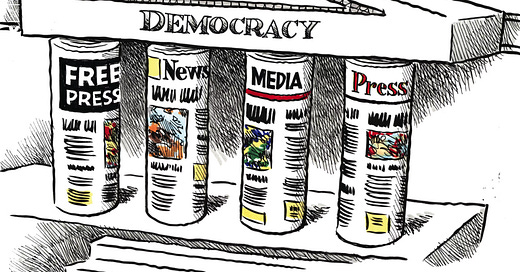TRANSCRIPT
I want to talk about journalism, about what to write and what not to write, and why freedom of the press is an ideal that is becoming increasingly problematic in a world where manipulation of the media by the powerful is making life difficult for those of us who want to speak truth to power.
Let me start with the moral dilemma investigative journalists and documentary makers such as myself sometimes face, which is that we become privy to information that is clearly in the public good, but might well put the lives and well-being of some people in the story at risk, if all the details of it were released.
Last week, as many of you will be aware, Atlantic Magazine’s Editor -in- Chief Jeffery Goldberg was accidentally added to a Signal Chat with a raft of US Security Officials, including US Secretary of State Marco Rubio, Secretary of Defence Pete Hegseth, CIA director John Ratcliffe and Director of National Intelligence Tulsi Gabbard – who discussed the sensitive details, timings and targets of an upcoming military operation against Houthi positions in Yemen.
For those of you who may not know, Signal is an open-source encrypted messaging service popular with journalists and others who seek more privacy than other text-messaging services can deliver. But it is a commercially available system and whether or not Signal is capable of being hacked, it is clearly open to human error. Let’s face it, most of us have sent a txt to someone in error, and that’s what happened here.
I’ll leave it to others to debate the ins and outs of the stupidity and repercussions of this security breach, because I want to focus here on what Goldberg decided to do with the information that was inadvertently delivered to him, what happened to him as result, and the lessons we journalists and investigative documentary makers need to draw from this incident.
So, what did Goldberg do?
After the Yemen attack happened and it was clear to him he hadn’t been set up by the White House to discredit him by tricking him into publishing false information, Goldberg decided to publish enough of the Signal Chat to show, that by including him in the conversation, America’s leading Defence officials had behaved in a foolhardy and potentially dangerous way by not using the official secure communication network. In doing so he chose not to publish any of the specific war plan information the Signal Chat contained, nor did he publish the names of any of the CIA or other people involved.
The response from the White House to Goldberg’s story was immediate. But whereas previous administrations might have taken the usual road of admitting the foolish error and firing some, or all, of the people responsible for it, the Trump administration chose to double down and attack the messenger.
Trump called Goldberg a "loser" and a "sleazebag", and US National Security Advisor Michael Waltz ( who, by the way, appears now to have been the person who mistakenly added Goldberg to the group chat) chimed in with calling the Atlantic Editor a liar and "scum".
Some of the officials such as Director of Intelligence Tulsi Gabbard said they couldn’t recall if any weapons, times, or target locations of the attack had been discussed, and argued that even if they had been, it wasn’t classified information.
So, the day after his initial publication, Goldberg said he was faced with a choice – either accept being called a liar and the discrediting of his magazine, or put up the facts justifying the public interest imperative of his initial article. Clearly Goldberg is made of stronger moral stuff than to cower at the first signs of Trump’s bullying, and so he chose to publish a follow up piece with enough details of the mission in it to prove that what he had stated in his initial article was true in fact. However, Goldberg also chose to self- redact the names and details of some service personnel whose lives could be in endangered if he revealed them.
While I know there are some people who live by strict unbreakable moral rules , there many, like myself, who try to figure out what is right and wrong in every moral situation that we face, so for my money Jeffrey Goldberg did the right thing. He published what was necessary to make the point of the stupidity of what these leading Defence officials had done, but held back on information that would have put the lives of some individuals at risk if he published their names.
Yes, I know there are much bigger moral issues here such as whether America launching such an attack was justified or not, but I’m just going to stick here with the lessons for journalism as they unfolded around the release of these Signal Chat messages, and the caution it holds for any young writer considering a career in investigative journalism or documentary work.
And perhaps the first thing to understand is that if you publish a story the establishment don’t like they will attack your credibility .
When I produced Inside Child Poverty in 2011, for example, there was a lot of backlash from the then right-wing establishment. NZ On Air Board Member Stephen McElrea, (who was also the electorate chairman for Prime Minister John Key at the time) tried to stop TV3 from screening it in the week leading up to the election, and after it went to air right- wing commentators such as Sean Plunket decried my programme as being so biased it should never have been funded.
In parliament National’s Social Development Minister Paula Bennett questioned whether there was even such thing as Child Poverty and openly giggled at the idea that you could measure it.
And there was a Broadcast Standards Authority complaint that I had been biased and unfair in the opinions I expressed about the effect that neoliberal economics had had on the lives of our children. Which , by the way, the BSA dismissed, stating “ The documentary provided a prime example of democracy at work, disseminating the type of information, and prompting the types of discussions, that should be welcomed during election periods.”
Don’t get me wrong. I haven’t mentioned my Inside Child Poverty documentary to polish my own apple, but just to point out that even here in New Zealand, when the right- wing feel threatened by a piece of hard hitting social journalism, that just as in America, they attack the credibility of the publication and make personal attacks on the messenger.
Would that same situation happen today?
No. Because my Inside Child Poverty documentary would probably not be funded.
Why? Because one of the first things our right- wing government did, was to get rid of the Public Interest Journalism Fund that made the making of such programmes possible.
In turn, this has made the cash- strapped TV Broadcasters gun shy of supporting analytical documentaries to NZ On Air, because first of all it might upset the current administration, and secondly, and just as importantly, if you publish something controversial, no matter how well researched, you are going to have to employ lawyers to answer BSA complaints ,and horror of financial horrors, you might even end up fighting a defamation case in court. (As I once had to do by the way – and won!)
So, by controlling the government purse strings, while at the same time privately funding their own media outlets, the political right in our country has been able to dominate the way the narrative of our nation is shaped.
How do we fight back against this imbalance?
Well, through social media. By supporting story tellers who are not afraid to speak truth to power.
You are listening to one of them, but there are many more - Economists like Bernard Hickey, Ganesh Nana and Susan St John, Doctors like Bryan Betty and Gary Payinda and political commentators such as Melanie Nelson, Bomber Bradley and Bryce Edwards, to name a few.
If you want a fairer society then please search them out and support them by reading and sharing what they write and say.
And, as that inspirational social activist Maggie Kuhn once put it –“ Speak up. Even if your voice shakes.”
Please consider becoming a paid subscriber for $9 a month (including GST) to help me continue my public interest journalism- speaking truth to power and giving a voice to those who have none.Membership will also give you access to all my posts , allow you to comment and join our chat group for discussions. Please restack and share posts you think are worthwhile as it all helps to build readership.
And to my paid subscibers - Thank you again for your support.











Share this post